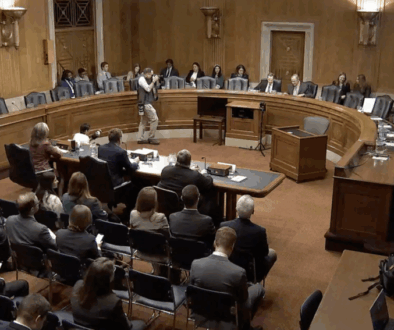Tribunal says Mexico violated trade agreement in banning GM corn
An international tribunal set up to resolve disputes between the United States, Mexico, and Canada has ruled that Mexico violated the terms of the international trade agreement in banning the import of genetically modified (GM) corn for human consumption.
The decision, handed down by a commission set up under the auspices of the US-Mexico-Canada Agreement (USMCA), was criticized by over a dozen civil and environmental groups, who argue that Mexico is well within its rights to restrict the import of this material for health precautions and others reasons.
Mexico has argued that it needs to ban GM corn to protect its citizens and the environment. Earlier this year, it filed a 189-page document with the tribunal outlining what it sees as the risks posed by GM corn and glyphosate.
“Mexico has legitimate concerns about the safety and innocuousness of genetically modified corn… and its indissoluble relationship with its technological package that includes glyphosate,” the Mexican government’s report states. There is “clear scientific evidence of the harmful effects of direct consumption of GM corn grain in corn flour, dough, tortilla and related products,” Mexico stated. More evidence is needed, Mexico says, to determine “whether and to what extent, such risks are transmitted to food products further downstream.”
The Mexican government said in a statement it would comply with the ruling. “The Government of Mexico does not share the panel’s determination, as it considers that the measures in question are in line with the principles of protection of public health and the rights of indigenous peoples, established in national legislation and in the international treaties to which it is a party.”
Genetically modified corn is used by most US growers; companies have engineered the crop to be toxic to certain insects and to tolerate being sprayed with certain herbicides. Corn, and products made with corn, have often been found to be contaminated with glyphosate, one of the active ingredients in Roundup weed killer, for instance, because farmers can spray the pesticide directly over the growing crop to kill surrounding weeds.
The U.S. has not done or commissioned the research necessary to really determine if GM corn has long-term effects on human health, said Chuck Benbrook, a long-time consultant and expert who worked with Friends of the Earth in defending the Mexican position. “The US government never did [an] appropriate risk assessment of GM corn, period,” he said.
As such, it is not appropriate for the US to claim that GM white corn is safe and that Mexico must take its word for it. “It’s irresponsible,” Benbrook said. Corn is a primary food and source of calories in Mexico.
The ruling does not apply to Mexico’s planned, but delayed, ban on the use of glyphosate. The ruling also does not dispute any of the science at issue. The USMCA will be re-worked in 2026.
CropLife International, which represents agrochemicals companies, applauded the decision.
“This is the clearest of signals that upholding free-trade agreements delivers the stability needed for innovation to flourish and to anchor our food security,” said Emily Rees, the president and CEO of the group, in a statement.
Timothy Wise, a senior research fellow at Tufts University’s Global Development and Environment Institute, wrote in a statement that “the tribunal’s ruling will not undo the fact that Mexico’s precautionary policies are indeed justified by a wealth of scientific evidence. By allowing the trade agreement to undermine a domestic policy that barely affects trade, it will further tarnish the legitimacy of an agreement already seen as favoring multinational corporations over public health and the environment.”
Mexico will continue to study the health impacts of GM corn and plans to eventually produce an appropriate risk assessment — which may not be to the liking of the U.S. or the biotech industry, depending on the outcome, Benbrook added.
In a series of filings earlier this year submitted to the United States-Mexico-Canada Agreement secretariat, many groups — including those committed to environmental causes, Indigenous sovereignty, and consumer rights — sided with Mexico.
One of the only groups to defend the US position was the US-based Biotechnology Innovation. Bayer AG, which bought Monsanto in 2018, is a BIO member as are other companies that make and sell GMO seeds and agrochemicals. Bayer did not immediately respond to a request for comment.
The variety and level of insecticidal proteins found in GM corn has increased greatly in the past few decades, and some research suggests it could have health impacts on mammals including humans, Benbrook said. Research suggests glyphosate ingestion may play a role in the progression of nonalcoholic fatty liver disease.
“We are disappointed in the panel’s ruling today, which shows the U.S. successfully wielded its power on behalf of the world’s largest agrochemical corporations to force their industrial technology onto Mexico,” said Angela Huffman, president of the ag NGO Farm Action.
“Mexico’s ban on genetically modified (GM) corn and glyphosate presented a tremendous premium market opportunity for non-GM corn producers in the U.S. Instead of helping U.S. farmers transition to non-GM corn production, our government has continued to force GM corn onto people who don’t want it and propped up agrochemical corporations based in other countries — such as Germany’s Bayer and China’s Syngenta.”
(Featured image via Getty Images for Unsplash+)




